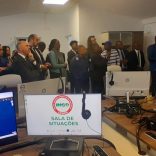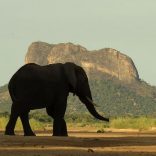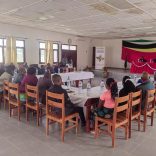Mozambique: INGD inaugurates weather warning system
Mozambican forests under threat, warns minister

Notícias (File photo)
Forests still cover 51 per cent of Mozambique, but this percentage is declining thanks to slash and burn agriculture, the exploitation of wood fuel, notably charcoal, and illegal logging, warned the Minister of Land, Environment and Rural Development, Celso Correia, on Wednesday.
Speaking at the opening of a conference organised by the Attorney-General’s Office (PGR), on the theme of “Effective Inspection of Legality for Sustainable Use of Forests”, Correia said that the rate of deforestation was about 0.58 per cent annually – this meant that every year Mozambique is losing about 219,000 hectares of forest cover.
The government, he said, had taken measures to halt the decline, included a ban on the export of unprocessed logs as from the end of 2016, and a five year ban on all exploitation of Ironwood (known in Mozambique as Pau-ferro).
As from the end of 2015, no further requests for areas for forestry exploitation had been granted, and all existing forestry licences were being assessed.
In April this year, Correia added, a 90 day ban on logging had been imposed on all forestry operators who do not have their own timber processing units.
The government had also strengthened the forestry inspection powers of the National Environmental Quality Control Agency, he said, and had introduced security features on licences and timber transit guides (to make it difficult to forge these documents).
The Minister said the government hoped “to promote the active and responsible participation of all stakeholders interested in the sustainable management of forest resources, including the local communities who have often been excluded from sharing in the benefits”.
In terms of economic benefits, the government wanted to prioritise the export of finished or semi-finished wood products, and not logs.
“If we do not take effective action”, said Correia, “we run the risk of losing the forestry potential we possess, with serious losses for local communities, for the environment, and for our economy. This would also increase the country’s vulnerability to climate change”.
Passivity and failure to act against illegal logging “would make us complicit in this environmental crime, which is currently benefitting a minority to the detriment of millions of Mozambicans, and of future generations”.
Also Read: Sofala: Chinese companies worried about limits on wood processing and exporting
Attorney-General Beatriz Buchili stressed the threat posed to humanity by climate change, pointing out that one of the factors worsening climate change was “the unsustainable exploitation of natural resources and particularly of forests”.
One of the key tasks of the Public Prosecutor’s Office, she said, is to defend collective interests, include the country’s forests, which are owned by the Mozambican state.
“We cannot, as a state, continue to watch impassively while our forests are exploited in an uncontrolled and illegal fashion”, she declared. Often logging was undertaken by unqualified operators, and even those who are qualified “exploit tree species that are protected by law, and thus violate the entire legal framework laid down by the relevant institutions”.
Illegal forestry operations, Buchili said, are characterised by “corruption, forgery of documents, fraud, contraband and money laundering. So all stakeholders – the communities where the resources are found, the forestry operators, the forest wardens, the police, the customs service and civil society – are called upon to step up inspection activities”.
“We must bear in mind that we shall only have good results”, she added, “if the efforts and strategies we adopt are integrated, while respecting the specific nature of each institution”.
Buchili stressed that it is a legal, but also a moral duty to defend the environment. Failure would penalise everyone “since natural phenomena, such as floods, high temperatures, soil erosion or storms, do not choose their targets. Some may suffer from these effects earlier than others, but the truth is that all of us, as inhabitants of this planet, will lose out”.
She praised Correia’s Ministry for “Operation Trunk”, the raids earlier this year against timber yards, which had dramatically demonstrated the scale of illegal logging and “brought into the limelight our institutional weaknesses”.
As for prosecutions, Buchili said that in 2016 the Public Prosecutor’s Office had handled a total of 129 cases of illegal exploitation of forest resources. She clearly thought this was insufficient, since she called on the meeting “to identify the constraints” and find the best ways of coordinating activities, from the local communities up to the bodies of the administration of justice.
The purpose of the conference, she stressed, was “to promote mechanisms for the legal and sustainable exploitation of forest resources, through the active participation of the various national and international stakeholders. This objective can only be attained if all the stakeholders comply fully with their functions”.
Crimes against biodiversity, Buchili added, often have a transnational component and thus require “the strengthening of mechanisms of international cooperation”. It was thus important that the PGR had recently signed memorandums of understanding with its counterparts in China and Vietnam.
China is the destination for most of the logs that were exported from Mozambique prior to the ban coming into effect, and is also the main market for ivory from elephants poached in southern Africa. Vietnamese demand drives the poaching of rhinoceros for their horns which are falsely believed to cure all manner of ailments, from hangovers to cancer.












Leave a Reply
Be the First to Comment!
You must be logged in to post a comment.
You must be logged in to post a comment.